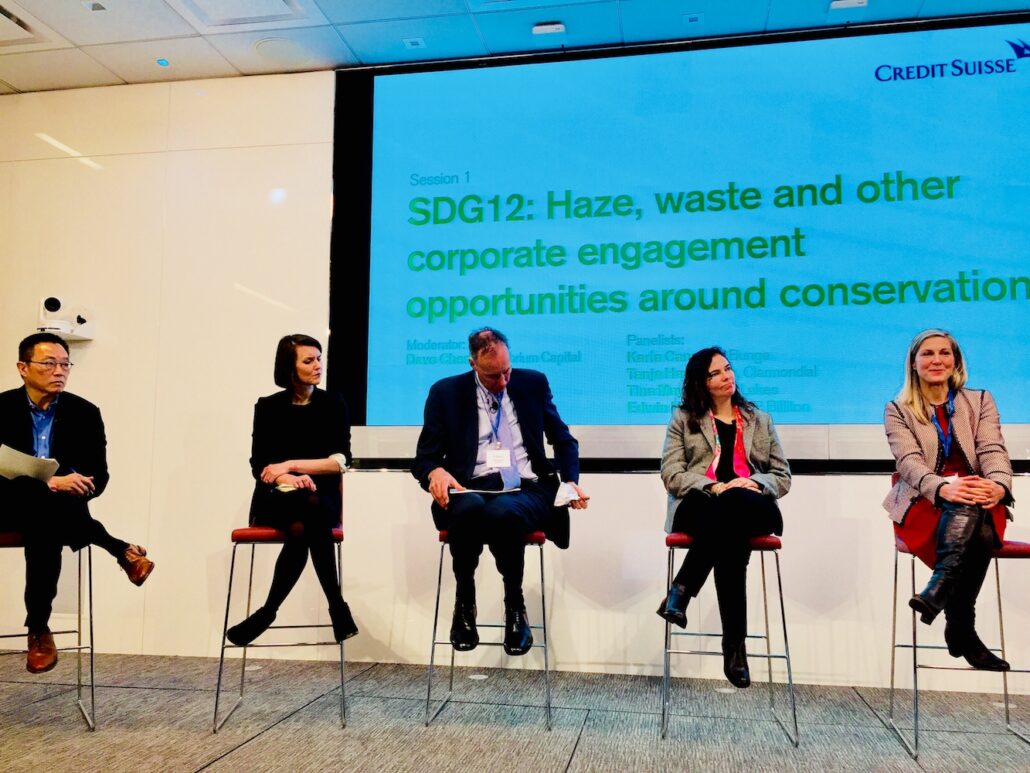Clarmondial
Notes from the SDG12 panel at Credit Suisse’s Conservation Finance event
On January 10th, Credit Suisse hosted the 5th annual Conservation Finance event in New York. Three corporates and Clarmondial took part in a panel, moderated by Dave Chen (Equilibrium Capital), titled “Haze, waste and other corporate engagement opportunities”. The corporates were represented by Karla Canavan (Bunge, a global agribusiness and food company), Tina May (Land O’Lakes, an agribusiness cooperative), and Edwin Mongan (BHP, a global resources company). The purpose of the panel was to discuss practical experiences and opportunities to engage corporates as agents of change promoting conservation.
Tina described two strategies that Land O’Lakes are pioneering:
- a USD 20m Dairy Innovation Fund for cooperative members, which supports new farm investments, including in biogas digesters, that result in additional revenues from green energy and carbon credit sales. The fund also incentivizes farmers to share farm data with the cooperative by offering discounted loans in exchange for information.
- a pay for success program in the Chesapeake Bay area (US). This program expects to deliver environmental outcomes through conservation practices on farms that allow local municipalities to satisfy storm water pollution requirements and return profits to capital investors. The initiative is supported by a USDA-NCRS Conservation Innovation Grant.
As a major trader operating in supply chains where there is high deforestation risk, and as a publicly listed company, Bunge is sensitive to the risks of unsustainable sourcing practices. Karla described Bunge’s commitment to conservation, including the motivation for its zero deforestation policy. She also described some of the steps Bunge has taken to implement this, including carrying out extensive mapping of sourcing areas in soy production areas in Brazil and Argentina, and the launch of a database to combat deforestation (agroideal.org). This free toolkit helps farmers in the Brazilian cerrado to expand into “go” zones, and is designed and implemented collaboration with major Non Governmental Organisations (NGOs) and companies, with the objective of helping to catalyze long term finance to farmers for zero-deforestation expansion as an incentive to develop the supply chains of the future.
BHP has committed to keep its annual absolute Greenhouse Gas (GHG) emissions in FY2022 at or below FY2017 levels which, in turn, are 21% below BHP’s FY2006 baseline. The company continues to proactively take steps to reduce its GHG emissions, and support mitigation activities more generally. BHP Billiton does this through several innovative programs, as well as through support for policy changes that can lead to a global price on carbon. One of the leading programs has been the issuance of the world’s first forest carbon bond in collaboration with IFC, Conservation International and Baker McKenzie. BHP also supports new and innovative ways to conserve and sustainably manage natural environments through its social investment framework and through its foundation.
Clarmondial is an advisory company that focuses on mobilizing capital to conservation projects and programs, with a specific interest in designing and implementing financially sound solutions that can achieve impact at scale. Tanja described the Food Securities Fund, an innovative financial product that helps to achieve sustainable agricultural practices in collaboration with major corporates and investors. It was recently selected by Convergence for design funding support. She also described transaction work with corporates focused on leveraging supply chains to support investments in smallholder farmer livelihoods, climate smart agriculture and green business model innovation, circular economy and water use efficiency. Clarmondial also recently published a report titled Capitalizing Conservation in collaboration with WWF, which summarizes different case studies to design and scale conservation investments.
The panel concluded with a discussion and a Q&A session. Highlights included:
- Corporate governance: the role that corporate governance plays in decision making and the ability to commit to longer-term conservation investments.
- Regulatory environment: the political environment and regulations are key drivers in creating an environment conducive for private investments in conservation.
- Partners: multilateral, bilateral and government agencies and foundations have an important role to play in facilitating transactions, e.g. through de-risking. NGO and research organizations can contribute technical knowledge and on-the-ground support. Specialized advisory firms and asset managers can facilitate structuring and capital mobilization, including helping to identify and design appropriate structures for a specific transaction or program of investments.
As Dave Chen summarized in his closing remarks, conservation finance needs to function as an ecosystem, with niche actors fulfilling specific roles. Given their reach, corporates are potentially powerful agents of change that can enable scale within the conservation finance space. And, many of the leading companies recognize this and are stepping up to the challenge. After all, as Henry Ford said, “a business that makes nothing but money is a poor business.” Supporting corporates to embrace their role in helping achieve conservation outcomes effectively and efficiently will continue to require dedicated support from the conservation finance universe.

